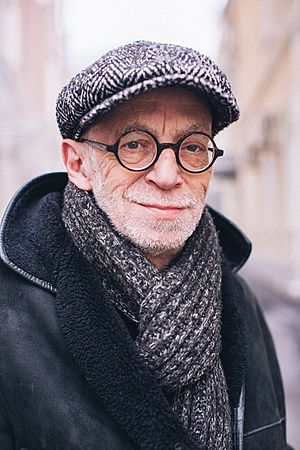Lev Rubinstein facts for kids
Quick facts for kids
Lev Rubinstein
|
|
|---|---|
| Лев Рубинштейн | |

Rubinstein in 2017
|
|
| Born |
Lev Semyonovich Rubinstein
19 February 1947 Moscow, Russian SFSR, Soviet Union
|
| Died | 14 January 2024 (aged 76) Moscow, Russia
|
| Alma mater | Moscow Pedagogical Institute for Correspondence Studies |
| Occupation | Essayist, journalist, poet, social activist |
| Awards | Andrei Bely Prize (1999) |
Lev Semyonovich Rubinstein (Russian: Лев Семёнович Рубинштейн; born 19 February 1947 – died 14 January 2024) was a famous Russian writer. He wrote essays, worked as a journalist, and was a poet. He also worked to make society better as a social activist. Lev Rubinstein was one of the people who started a special art movement called Moscow Conceptualism.
Contents
About Lev Rubinstein's Life
Lev Rubinstein was born in Moscow, Russia, on 19 February 1947. His parents were Jewish. He studied philology, which is the study of language and literature. He went to the Moscow Pedagogical Institute for Correspondence Studies. Today, this school is called the Sholokhov Moscow State University for Humanities.
After finishing his studies, Rubinstein worked as a librarian. He also worked as a bibliographer, which means he helped organize books and information. While working with catalog cards at the library, he got an idea. These cards later inspired his unique "notecard poems."
In the 1970s and 1980s, Rubinstein became a very important writer. He was part of the underground literary scene in the Soviet Union. This means his work was not always officially approved by the government. He was especially known for being part of Moscow Conceptualism. Later in his life, Rubinstein started working as a journalist. He also became more involved in social activism. He wrote for magazines like Itogi and the Weekly Journal. In 1999, he won the Andrei Bely Prize for his writing. Lev Rubinstein was married to Irina Golovinskaya. They had one daughter named Maria.
Lev Rubinstein's Special Poems
Rubinstein was famous for his "notecard poems." Imagine a poem where each part, or stanza, is written on a separate notecard. That's how his poems worked! These notecards made people think about the poem in a new way. They showed that the words were not just ideas, but also physical objects.
To read one of his poems, you had to physically interact with the cards. Even though each card was separate and numbered, you still had to read them in the correct order.
Rubinstein's poems mixed different kinds of writing. They could switch between poetry and prose, which is like regular writing. Sometimes, they even looked like a play, with notes for the audience. Much of his writing used "quasi-quotations." These were phrases that sounded like they came from everyday conversations. But actually, Rubinstein carefully created them with a special style and rhythm. He often used the writing style of famous Russian authors. However, he wrote his own words in that style. This made them sound like quotes, but they were his original thoughts.
Moscow Conceptualism Explained
Rubinstein was closely connected to the Moscow Conceptualists. This was an art movement in Russia. In this movement, the main idea or concept behind the art was more important than how it looked. Rubinstein himself said that Moscow Conceptualism was about realizing that "the world is divided." He felt that "all the texts are written, the paintings are drawn." So, for an artist, the main job was to "rethink" and "rename" things. He believed that "to name is more important than to do." This means thinking about and giving new meaning to art was key.
Moscow Conceptualism was also a way to push back against "socialist realism." Socialist realism was an official art style in the Soviet Union. It showed life in an idealized, often unrealistic, way. Conceptualism focused on how individuals felt living with this "myth" of socialist realism.
His Passing
On 8 January 2024, Lev Rubinstein was hit by a car in Moscow. He sadly passed away from his injuries six days later, on 14 January 2024. He was 76 years old.
Awards and Recognition
- 1999: He won the Literary Andrei Bely Prize. This award was for his work in humanitarian research.
- 2012: He received the literary prize NOS. This was for his book called Signs of Attention.
 | Anna J. Cooper |
 | Mary McLeod Bethune |
 | Lillie Mae Bradford |

